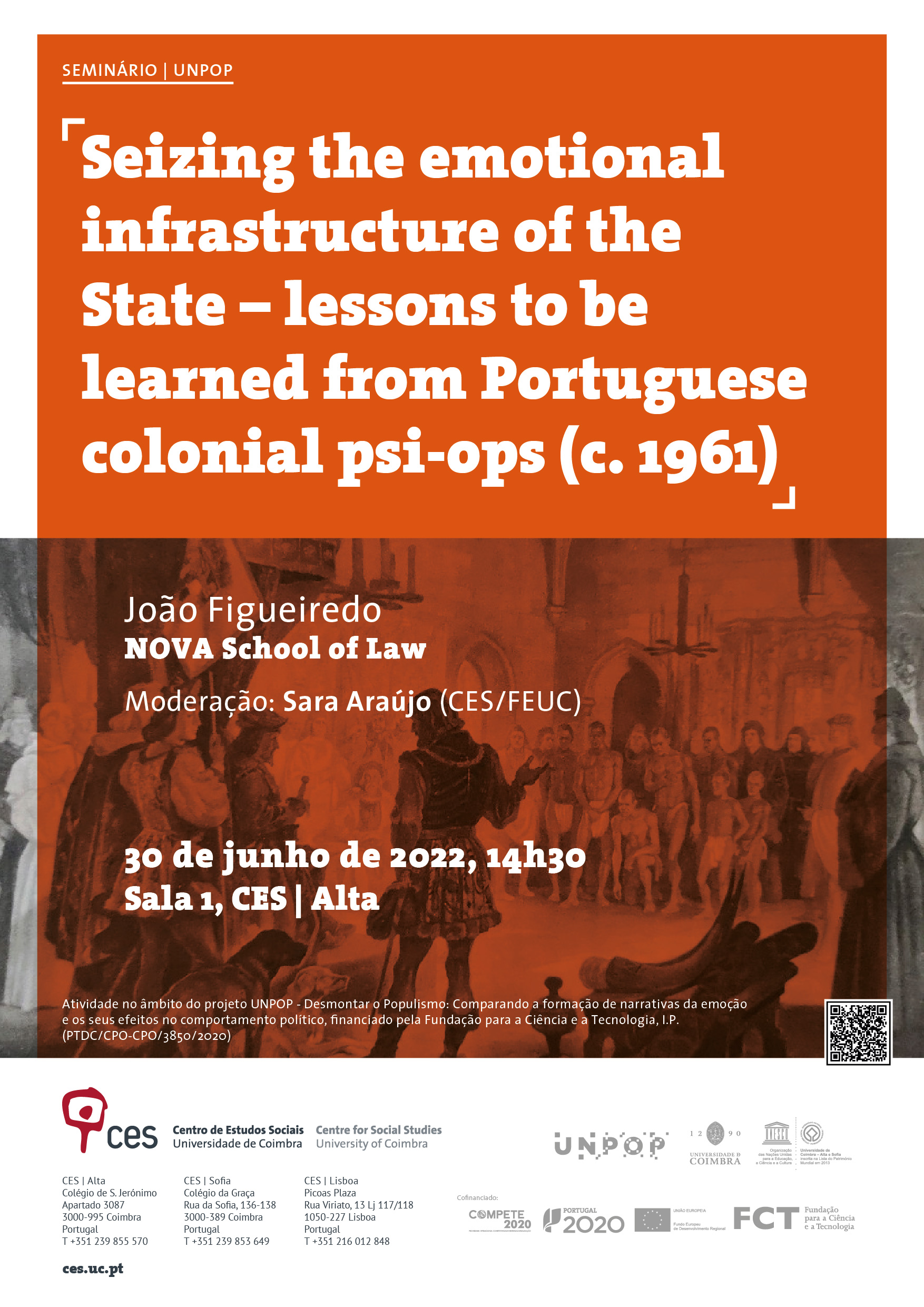Seminário | UNPOP
Seizing the emotional infrastructure of the State – lessons to be learned from Portuguese colonial psi-ops (c. 1961)
João Figueiredo (NOVA School of Law)
30 de junho de 2022, 14h30
Sala 1, CES | Alta
Moderação: Sara Araújo (CES/FEUC)
Apresentação
Scholars of the Portuguese empire often claim that Portuguese elites used myths and popular narratives to justify the expansion and maintenance of their Empire. Focusing primarily on nineteenth-century parliamentary debates, Valentim Alexandre argues that politicians successfully mobilized the myths of a ‘New Brazil’ or ‘Eldorado’ in Africa and the myth of ‘The Sacred Inheritance’ to rally support for their colonial policies. Focusing on the print culture that circulated during the same period, Beatrix Heintze and Isabel Castro Henriques argue that dehumanizing myths about African ‘Others’ often enabled imperial aggressions. Finally, ever since Cláudia Castelo deconstructed ‘Lusotropicalism,’ a great number of scholars have written about the real or imaginary impacts of this late-colonial myth (c. 1961-62). In this paper, I will question the utility of all these arguments in furthering our understanding of contemporary populism. Basing myself on Frédéric Lordon’s Imperium: Structures and Affects of Political Bodies (2022), I will argue that to understand the mechanics behind populist use of Portuguese colonial heritage we should be paying attention to the emotional infrastructures of the State, and not to the ‘truth’ content of these myths. As Lordon makes clear, this shift in perspective hinges on the adoption of a ‘critical anthropological realism’ that allows us to grasp how common affects coalesce and are then institutionally captured. I will further argue that the Portuguese Army adopted such an anthropological-realist approach when the colonial-Liberation wars erupted in the 1960s. This can be grasped by engaging with the psychological actions (psi-ops) manuals of the period.
Este ciclo de eventos faz parte do projeto UNPOP - Desmontar o Populismo: Comparando a formação de narrativas da emoção e os seus efeitos no comportamento político, que tem como objetivo principal explorar como as narrativas de emoção permitem uma análise mais profunda do modo como os fenómenos populistas se constituem e influenciam o comportamento político. Assim, o ciclo de eventos desenvolvido ao longo do projeto abordará diversas questões envolvendo o recente crescimento do populismo, com foco no papel das emoções – tanto aquelas tidas como negativas como raiva e medo, quanto as tidas como positivas como esperança e amor – no comportamento político.
Coordenado por Cristiano Gianolla e Lisete Mónico e acolhido institucionalmente pelo Centro de Estudos Sociais e pelo CINEICC - Centro de Investigação em Neuropsicologia e Intervenção Cognitivo-Comportamental - da Universidade de Coimbra, o projeto UNPOP conta com o financiamento da Fundação para a Ciência e a Tecnologia, I.P. (PTDC/CPO-CPO/3850/2020).
Nota biográfica
João Figueiredo é licenciado em Antropologia pela Faculdade de Ciências e doutorado em Altos Estudos em História, ramo Império, Política e Pós-Colonialismo pela Faculdade de Letras da Universidade de Coimbra (2016). Foi Investigador Auxiliar na NOVA School of Law da Universidade Nova de Lisboa entre 2019 e 2022, no âmbito do projeto “Legal Pluralism in the Portuguese Empire (18th to 20th centuries)”, e será fellow do Käte Hamburger Kolleg “Legal Unity and Pluralism” da Universidade de Münster em 2022-23. Investiga a transição entre o sistema escravocrata do antigo regime português e o racismo sistémico do século XX (c.1820-1930), abordando-a a partir de vários ângulos disciplinares, da história social à história do direito e à antropologia histórica. Enquanto cidadão e anti-racista militante envolveu-se em várias iniciativas e colaborou com NGOs como a DJASS e o SOS Racismo.


